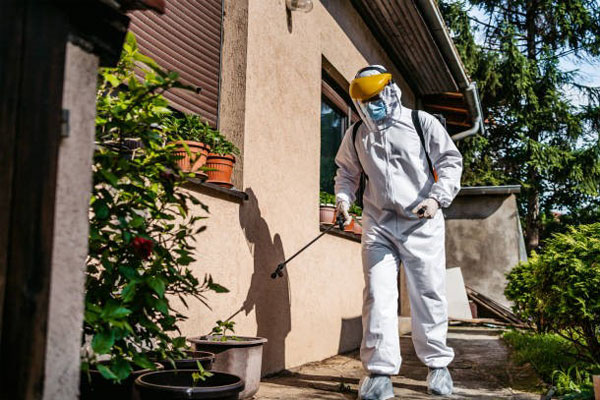Homeowners Associations (HOAs) play a crucial role in maintaining the cleanliness, aesthetics, and overall living conditions of shared residential spaces. Unsurprisingly, pest control is a fundamental aspect of this responsibility.
Are you planning to invest in real estate within a neighborhood? Do you need insight into how active HOAs address pest control within their communities? From preventative measures to response strategies, understanding the role of HOAs in pest management is vital for homeowners and residents alike.
How do HOAs handle Pest Control?
1. Preventive Measures
HOAs often address pest infestations by adopting preventative measures. To that end, they establish guidelines for residents to prevent pest infestations. These guidelines may include proper garbage disposal, maintaining yards, and sealing entry points. By enforcing appropriate rules that deter vermin from homes, HOAs can reduce the chances of an infestation in their managed community.
2. Regular Inspections
HOAs may conduct routine inspections of shared living spaces. Representatives can inspect common areas and exteriors with prior notice to identify potential pest issues. It also allows the community to deal with infestations promptly. Hire a responsible HOA management company in Philadelphia to make sure maintenance is scheduled accordingly with HOA regulations.
3. Professional Pest Control Services

In the event of a pest infestation, HOAs often contract with pest control companies to respond to specific issues within the community. Thus, if one of the common areas has vermines, such as termites or mice, the HOA can seek professional assistance to restore order. On the other hand, HOAs can also contract an expert exterminator to provide regular treatments for common areas and prevent potential issues, making residents more comfortable.
4. Education
Pest Control in Glen Ellyn plays a vital role in maintaining a pest-free environment for their communities by educating homeowners. Some organize community meetings, share pamphlets, or provide residents with resources to report and address pest problems.
5. Shared Responsibility
In some cases, HOAs charge association fees, which goes towards maintaining the shared community. Such pooled funds also cover pest control costs, ensuring that the financial burden is spread equitably. It also enhances the overall quality of life for residents by ensuring the area remains pest-free.
Responsibility Division with Owners and HOA
1. Common Area
Responsibility division with owners and HOA often differs from one community to the next. But most of them use a general pattern. The HOA is usually responsible for pest control in shared or common areas of the community. Such areas include lobbies, hallways, outdoor spaces, and amenities like swimming pools. Often the HOA contracts professional pest control services to manage these areas.
2. Exteriors
Often, the responsibility for pest control on the exterior of individual homes or units falls to the homeowners. That includes maintaining their yards, gardens, and taking measures to prevent pests from entering their homes. However, HOAs might create and uphold exterior standards as a way for handling pest control.
3. Individual Units
Pest issues inside individual units are typically the responsibility of the homeowner or tenant residing in that unit. If you encounter rodents within your living space, the expectation is often that you handle it with pest control measures or by calling a professional at your own cost.
4. Shared Costs
All residents often have to share the costs of pest control in common areas through their association fees or dues. In some cases, homeowners may also share the costs of extermination for specific infestations in shared spaces.
State Laws for Pest Control Pennsylvania
In Pennsylvania, pest control is regulated by the Pennsylvania Department of Agriculture. The primary regulatory framework for pest control in the state includes the Pennsylvania Pesticide Control Act. Here are key points regarding pest control regulations in Pennsylvania:
1. Licensing
Pest control businesses, including exterminators and pest management professionals, must be licensed by the Pennsylvania Department of Agriculture. Licensing ensures that service providers meet specific requirements for pest control services.
2. Pesticide Application
The Pennsylvania pest control act also regulates the use of pesticides. Licensed pest control professionals must follow strict guidelines when applying pesticides and similar products. The act also requires users to be knowledgeable about the products they use and the potential risks associated with them.
3. Record-Keeping
Pest control professionals must also maintain records of pesticide applications, including the type of pesticide they use, location, and date of application. These records may need to be available for inspection.
4. Training and Certification
Pennsylvania offers training and certification programs for individuals involved in pest control. These programs ensure that professionals are well-informed about the safe and effective use of pesticides.
5. Integrated Pest Management (IPM)
IPM is encouraged in Pennsylvania as an eco-friendly and cost-effective approach to pest control. It emphasizes prevention, monitoring, and non-chemical solutions before turning to pesticides.
6. Consumer Protection
Regulations in Pennsylvania aim to protect consumers by ensuring that pest control services are performed safely and effectively. Consumers have the right to know what pesticides are being used and any potential risks associated with them.
Conclusion
Understanding how Homeowners Associations (HOAs) handle pest control, the division of responsibilities with homeowners, and the state regulations governing pest control, such as those in Pennsylvania, is crucial for maintaining a pest-free living environment in managed communities.
HOAs play a pivotal role in managing and financing pest control efforts in common areas, while homeowners are typically responsible for maintaining pest-free conditions within their individual units and exteriors. Both parties can outsource pest prevention and control to a professional property manager who can ensure safe and effective extermination. By adhering to these guidelines, both HOAs and homeowners can contribute to pest-free and well-maintained communities.











